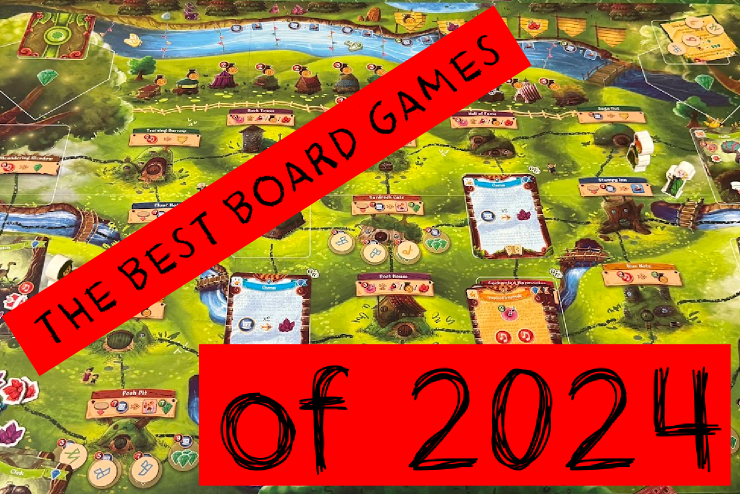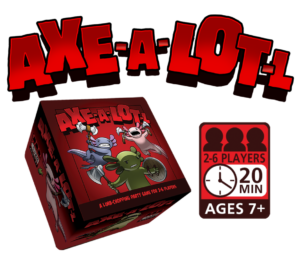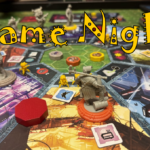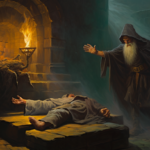There are some games I’m not going to talk about here. They are the “emeritus” honorees, games that we’ll bring to the table whenever we just want to have some fun with a game everyone enjoys, no questions asked. Those are:
- Terraforming Mars (engine building)
- Lords of Waterdeep (worker placement)
- Red Dragon Inn (party game)
I think I probably have written lots about those games before.
We are serious board gamers. It’s not unusual to spend two nights a week board gaming. You discover who your friends and family really are when you’re staring at each other over a colorful cardboard square.
Axe-A-Lot-L (2024)
Case in point: Axe-A-Lot-L. This card game, where you play an axolotl desperate to keep their limbs from the other axolotls that covet them, would seem to be a friendly game that would bring a family together. I gave it to my granddaughter for her birthday, and when I played with her, she was an aggressive demonic force.
She attacked everyone around her. If there was just going to be one surviving axolotl, it was going to be hers. It’s not just this game; the one time she played Red Dragon Inn with the adults, the took special glee in knocking me out of the game.
I met the game’s creator, Tim Buckley, better known as the artist behind the “Ctrl+Alt+Del” web comic, at a con a year or two back. Not thirty seconds into our chat, he was pulling out his phone to show the latest pictures of his pet axolotl, Sushi, taken just that morning.
I’m a big fan of his comics, and was pretty impressed with the game. The kid who’s in the target audience loved it, and there’s a lot of bizarre cards to keep people laughing as their number of limbs dwindle. Because when you’ve lost all your limbs, well, you become an enraged, berserk ball of floof and then, watch out.
Bardwood Grove (2024)
I struggle to describe Bardwood Grove. It’s a campaign deck-building game where you play a bard who wants to recruit the biggest following and the baddest songs as they rock, or harp, or blow, or strum, or pound the forest down.
The game plays out in Bardwood Grove, a forest filled with various performance venues. Each bard spends their turns exploring the forest and playing cards that either go toward making a song or preparing for a performance. When they have traveled enough, they set up their amps and sing the song they’ve been preparing and use the cards in the song to buy fans, new cards, victory points, or to charm the various friendly forest creatures into following them and lending their own unique voices to the next song.
Each new season brings new events and new bards. Each bard has a unique ability that makes certain kinds of songs more powerful. My character, the elf harpist, can spend volume (a resource in this game) to create lyrics during a song. Lyrics, melody and crystals are spent during a song to buy new cards or victory points, or to attack other bards to gain their badges that you can then use to play yet another part of the game.
It’s a complicated game. But also, goofy fun.
Tales from the Loop, the Boardgame (2022)
Growing up near the largest particle accelerator in the world is tough. All the adults are employed at the Loop, working on super science, leaving their kids alone much of the day to deal with the dangers their absent parents inadvertently release.
Based on famed Swedish artist Simon Stålenhag’s art book of the same name, Tales from the Loop has players take on the role of a kid from a Goonies-like group of friends. Each must balance schoolwork and chores with solving the mysteries of the islands where they live. They don’t need to go looking for adventure; it comes to them. Rampaging robots. A new girl in school who seems somewhat “off”. Plants with mind-control pheromones growing at the power center. Even the most fantastic stuff seems normal when that’s all you know.
Each game scenario plays out over a period of one or two weeks. Each day, the kids have to deal with a problem at school, investigate rumors of interesting things happening all over the island (including in restricted zones), and progress the plot, which branches based on how adept the kids are at solving mysteries, which involve rolling a 6 on one or more six-sided dice. Success grants rewards, failure imposes injuries, exhaustion or other conditions.
Kids can help each other out by improvising items to solve situations or by adding their dice to tricky rolls. This encourages kids to stick together. But by doing so, they won’t be able to take on the rumors which will raise the “enigma” rating of the island, and that will make the plot nearly impossible to complete. And so the kids have to split up, but then they won’t have the necessary items or dice to pass them alone. And then all the kids get together to hack a robot, but they can’t do it all in one day. Exhausted, they return home, and then the robot resets. All that wasted effort!
We loved the concept of the game. But, it just doesn’t work. We made some house rules to make things somewhat more achievable but in the end, we felt the game could have been better.
In Too Deep (2023)
You’re an elite member of a future spy organization looking into the dealings of the evil Syndicate. You’ll never be able to infiltrate the organization on your own; it’s lucky that you’ve tapped into the brains of all the supervillains in the city. They can go where you can’t. They will help you investigate the Syndicate, but they’re going to need you to look the other way as they go about their business, which is crime.
You tag along psychically with up to three villains, urging them to look into clues and data as they commit their crimes. But the life of a supervillain can be exciting. Sometimes, instead of asking them to go easy, you just ask them to do more. That’s when you know you’re in too deep.
Hey! That’s the name of the game!
This is the kind of game that requires thinking ahead. You’re given two cards — a major crime that advances the plot, and a minor crime that can be completed at any time. All sorts of crimes require specific conditions to complete; the law looking elsewhere, or certain items present or being held, or certain criminals being with you, in the neighborhoods adjacent, or on the other side of the city, etc. Major crimes might require all of these.
If you were playing alone, not much of an issue. But the other spies are trying to complete their crimes. They can take your villains from you, or move someone or something you had placed in a spot for a reason. You are competing with them for “best spy” award, so you can’t work together.
It’s fun when a plan comes together. But even when things seem to be going right, the end of the round might reveal that you don’t have all you need after all, and the Syndicate has gotten away again.

Nemesis (2019)
You awaken from the hibernation chamber to find yourself stranded on a starship. There’s a corpse on the floor. The other pods are opening, disgorging people just as confused as you. You’re the pilot; you know that, even if you’re not quite sure where the control room is. That person over there is a combat vet, and that one is a scientist. Between you, you should be able to figure out what happened. Your personal comm unit beeps; you’re informed that the ship has been boarded by some unknown power, and the ship has dropped from hyperspace and woken the crew — you — to see what’s wrong before it continues on to Earth. There are two attachments: missions for you. One wants you to redirect the ship to travel to Mars, to protect Earth. The other one wants you to kill the scientist. They have been deemed disloyal to the Company.
It’s a legally-distinct variant of the SF/horror classic, Alien. The game rewards you for cooperating with other players and exploring the ship together, but there’s always going to be the suspicion that you and the player you’re paired up with don’t have the same goals. You want to kill the intruders, but this person seems to be trying to bring one home alive. And that person over there keeps suggesting you check out that room with the airlock… alone.
The ship is damaged and needs repairs. Alien intruders are stalking you. You need the other crew, but can’t trust them. If you can only make it to an escape pod and make it Someone Else’s Problem, just maybe you can survive.
We played a lot of Nemesis. Aside from the standard “aliens hunting crew through a huge spaceship” mode, expansions go through the aftermath of a previous successful run, and what has happened now that the intruders have escaped onto Earth itself.
HeroQuest (1989/2021)
It’s called “The HeroQuest Game System”, as the game itself is just a template for any number of adventures. The base game sets four heroes — a barbarian, a wizard, an elf, and a dwarf — on a mission to explore a wide variety of different castles, dungeons and other structures that all play out on the same game board, decorated with doors, traps and stone walls to form a unique environment.
One player takes on the role of the mad wizard in charge of the dungeon, while the others play the heroes, moving in turn through the dungeon, exploring, finding treasure, battling encounters and having fun. Soloing is discouraged, but some characters are better alone than others. Bite off more than you can chew, though, and you might die far from help and hope someone comes by to get your body and your gear so that, next adventure, you won’t be starting from zero again.
It’s a simple system, but it’s an amazing platform for a cooperative dungeon run that rewards players with items and gold as they continue their adventures. We played quite a lot, with expansions allowing two players to move on to newer classes (thief and monk). Toward the end, we became a little overpowered, and the final boss fight wasn’t as exciting as it might of been.
For the amount of fun we had with it, HeroQuest is my pick for the best board game that we played in 2024.










